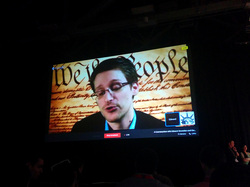
Snowden, it seems, is full of endless tidbits about how the United States gathers information. But his periodic revelations are growing tiresome for a reason that ought to be obvious.
He lives in exile in Russia, a nation whose leader makes no secret of controlling how the media reports things, who forces
| | opposition leaders to either leave the country or face charges and who, not insignificantly, has just claimed a part of Ukraine by force. Snowden, a former NSA contract worker, chose exile there because he faces charges of espionage in the United States for revealing things he felt were so egregious he no longer could keep quiet about them. And yet neither he nor his friend, Wikileaks founder Julian Assange, seem concerned enough about the blatant abuses in Russia or other countries to dig deeper and expose more. If he looked closer, he might discover that one of the greatest threats to freedom worldwide is poverty — or, in other words, the sort of desperate condition that seems impossible to overcome through education or hard work. Its close cousin is official corruption, which tends to stifle liberty, private enterprise, innovation and creative energy. The Index of Economic Freedom, published by the Heritage Foundation and the Wall Street Journal, says Russia imposes “bureaucratic obstacles and inconsistent enforcement of regulations,” and that its subsidies, state-controlled businesses, and outmoded labor code “limit employment growth” and stifle entrepreneurism. Ukraine suffers from much the same. The Index says business managers do best there if they have tight relations with politicians, and the court system does what the government directs. When former president Viktor Yanukovych began to reject closer ties to Europe in exchange for a tighter relationship with Russia, it led to the protests that forced him from office, and that gave Russian President Vladimir Putin an opening to invade. Snowden now tells the Washington Post the NSA has a program called MYSTIC, which lets officials rewind phone calls officials think might reveal something of importance. As with every other detail revealed about NSA practices, this one is an attention getter. The only thing missing is context and perspective. Why, in other words, is he telling us this? The U.S. government spies on people. We get it. The NSA is a huge agency with the resources to build a profile on just about anybody it chooses. We get that, too. But why does the NSA do it? Could there be noble reasons, even if the methods aren’t the best? Does Snowden care at all about the security of the nation he fled? Does he think the NSA should stop spying altogether, or can he imagine a reason why a spy agency might be important in a dangerous world? What would he consider proper spying? In a recent piece for The Economist, Edward Lucas said Snowden is a “useful idiot” at best, whose exposure of U.S. spying techniques helps Russia more than any other country. The author of a book titled, “The Snowden Operation: Inside the West’s Greatest Intelligence Disaster,” Lucas wrote, “For all the media hype in The Guardian, the BBC and elsewhere, Snowden’s published material does not prove systematic, sinister wrongdoing or abuse by the NSA or its British counter, GCHQ.” With Russia’s recent aggression, it ought to be obvious to all that the world is a dangerous place. It is proper for Americans to be questioning how the NSA gathers data and how their constitutional freedoms are guarded. Snowden has succeeded in starting a soul-searching national dialog on that. The president has even announced NSA reforms, even though they don’t change much. But it’s no longer convincing, or even noble, to claim a sort of relativistic neutrality while hiding in Russia. All espionage is not relative. All systems of government are not equal. Systematic abuses, sanctioned or condoned by the state, are worse than the data a nation gathers in defense of liberty. It’s time for Snowden to make a case for himself. |

 RSS Feed
RSS Feed

